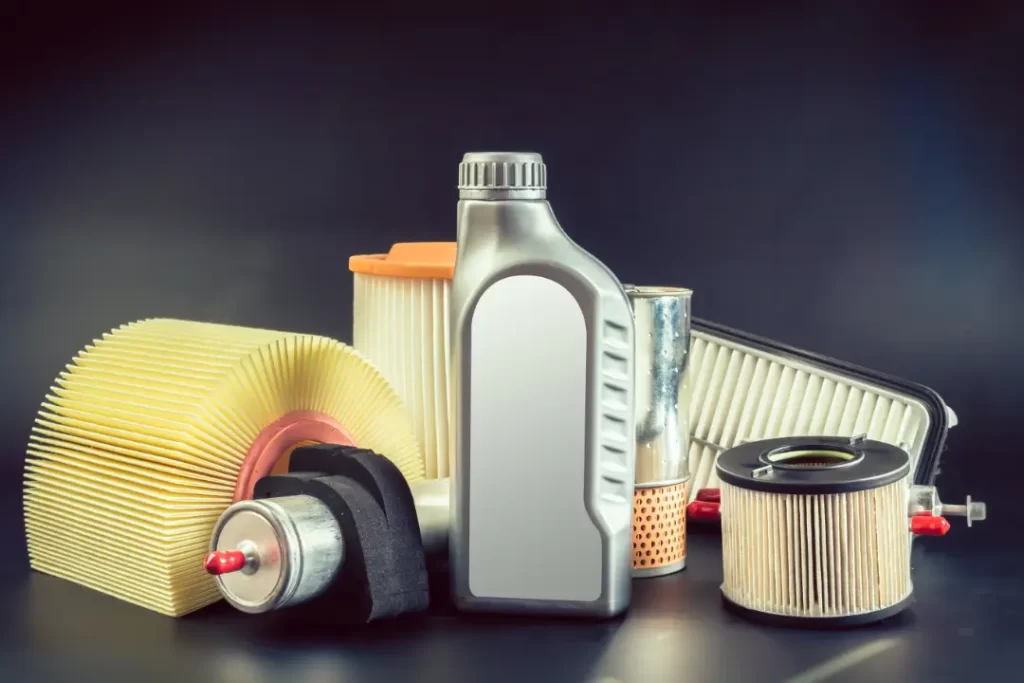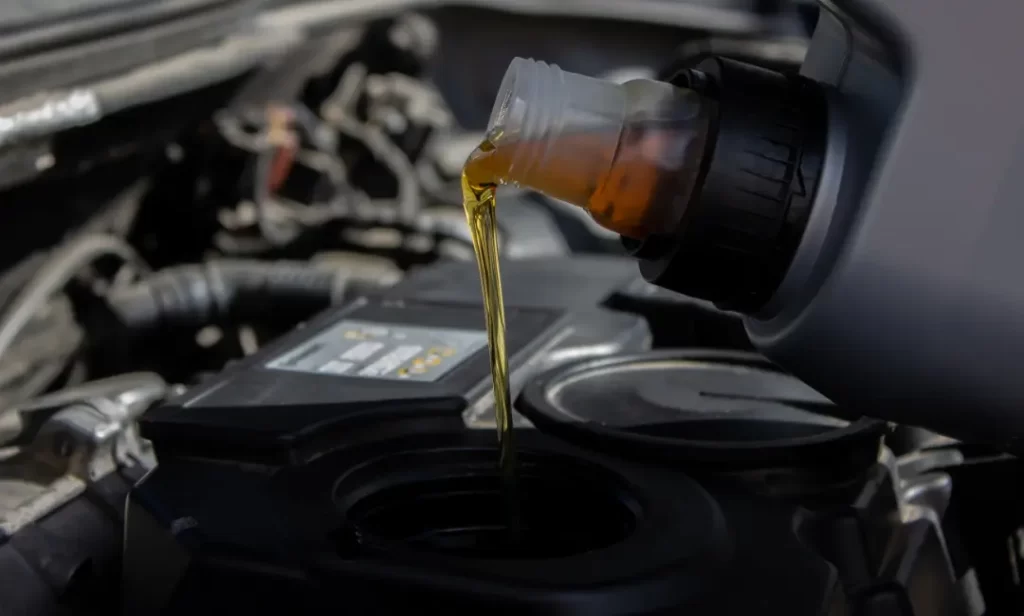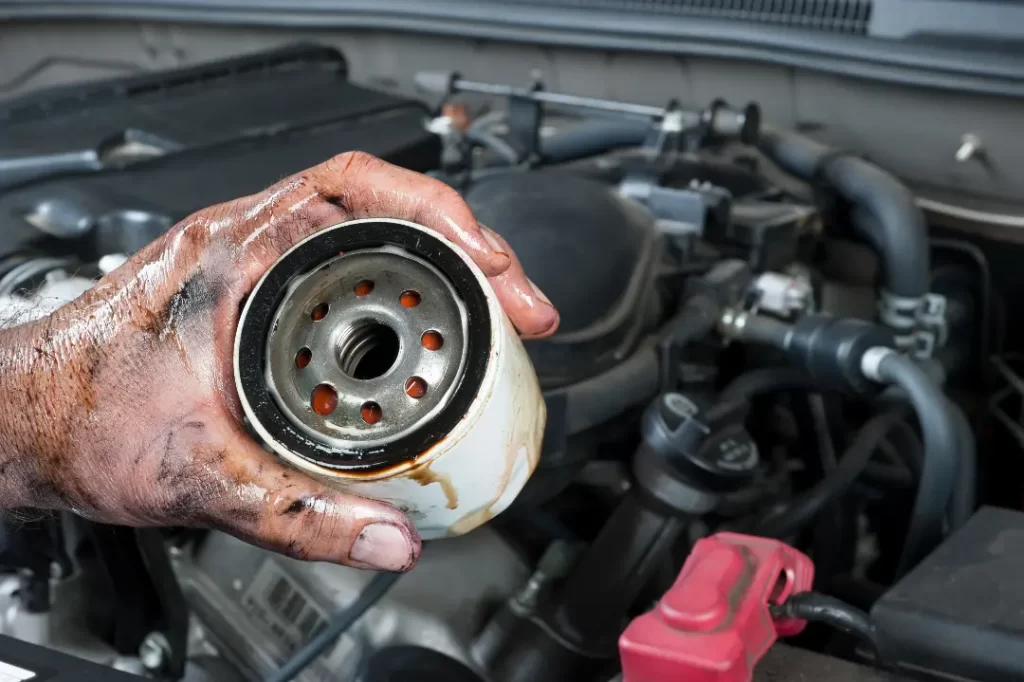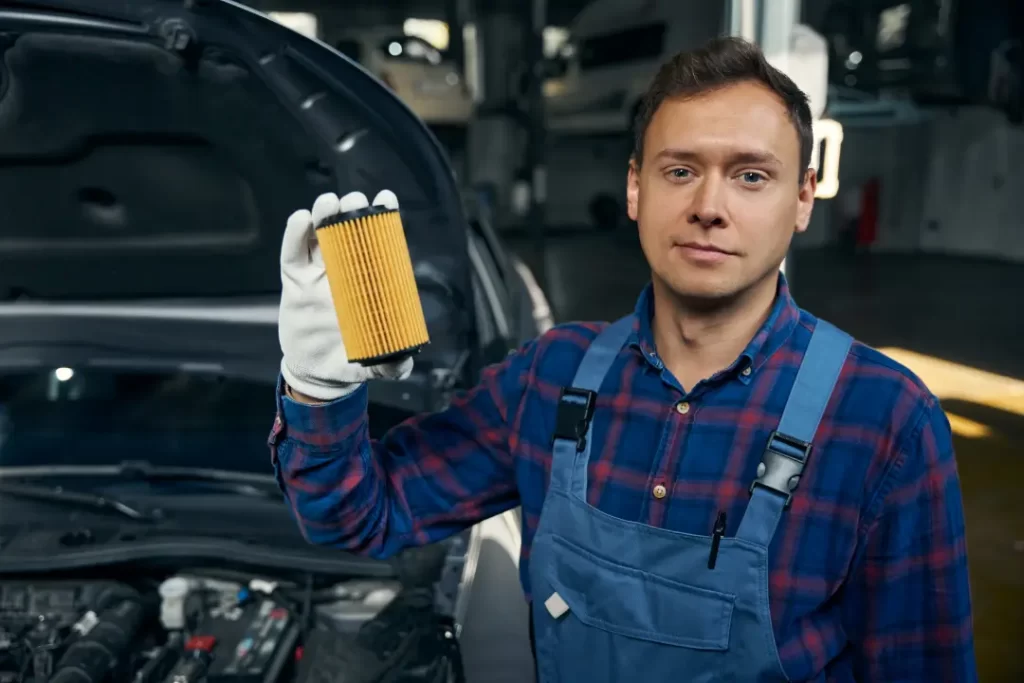Skipping oil and filter changes can severely damage your engine. It is crucial to change oil regularly to avoid increased friction, overheating, and possible failure. Learn what happens if you don’t change the oil and filter and why this maintenance is essential for your car’s health.
Key Takeaways
- Regular oil and oil filter changes are essential to maintaining engine lubrication, cooling, and performance and preventing contaminants from causing damage.
- Neglecting to get your oil changed can lead to increased engine wear, overheating, potential engine failure, reduced fuel efficiency, and costly repairs.
- A clogged or dirty oil filter can result in poor engine performance, unusual noises, increased fuel consumption, and severe engine damage due to unfiltered oil circulating through the engine.
The Role of Engine Oil and Oil Filters
Engine oil is the lifeblood of your vehicle, performing the crucial role of:
- Minimising friction between the engine’s moving parts
- Forming a thin, protective film that ensures these components glide smoothly past each other, preventing excessive wear and tear
- Playing a vital role in cooling by absorbing and dissipating the heat generated during combustion.
Using synthetic oil can extend oil change intervals and enhance engine efficiency, providing superior protection against heat and oxidation.
Oil filters are the unsung heroes that keep your engine oil clean and effective. They:
- Capture dirt, debris, and metal particles
- Prevent these contaminants from circulating and causing potential engine damage
- Without a high-quality oil filter, these harmful particles would wreak havoc on your engine’s internals, reducing performance and longevity.
Modern oil filters incorporate advanced technologies like anti-drain back valves, which prevent oil from draining back into the engine when it’s off. These features ensure that the engine receives optimal lubrication upon startup, minimising wear during this critical phase. Maintaining a clean oil filter enhances your engine’s performance and extends its lifespan.
You can’t overlook regular oil changes if you aim to keep your engine running smoothly. Fresh oil and a new filter ensure that your engine components remain well-lubricated and free from harmful contaminants. Neglecting this simple maintenance task can lead to a host of problems, which we will explore in the next sections.

Consequences of Skipping Oil Changes
Neglecting oil changes invites disaster. When you don’t change your engine oil regularly, you invite increased wear, overheating, and even potential engine failure. The oil loses its lubricating properties, causing more friction and less efficiency, which puts undue stress on your engine components.
Increased engine wear can lead to higher oil consumption, resulting in burning oil, which is often indicated by black or gray exhaust fumes.
Engine components can overheat and suffer from thermal stress without properly cooling fresh oil. This can lead to severe damage over time as the engine parts expand and contract under extreme temperatures. The consequences of such neglect aren’t just short-term; they can result in long-term and permanent damage to your engine.
Skipping oil changes increases the chance of oil starvation, where vital engine parts don’t get enough lubrication, which can lead to catastrophic engine failure, leaving you stranded and facing costly repairs. Making a small investment in regular oil changes can spare you significant headaches in the future.
Effects of a Dirty or Clogged Oil Filter
A dirty or clogged oil filter silently sabotages your engine’s health. When your oil filter is clogged, it can’t effectively remove contaminants from the engine oil, leading to:
- Sputtering performance
- Dirty motor oil deposits gunk on engine parts
- Noticeable loss of power
- Sluggish operation
You might also hear unusual engine noises, such as rattling or clicking, due to inadequate lubrication of internal components. These noises clearly indicate that your oil filter is compromised and needs replacement. Additionally, a clogged oil filter reduces fuel efficiency and increases fuel consumption, as the engine has to work harder to compensate for the lack of proper lubrication.
In severe cases, a clogged oil filter can activate a bypass valve, allowing unfiltered oil to circulate through the engine, which can cause significant damage and shorten the engine’s lifespan. Regularly changing your oil filter ensures only clean oil flows through your engine, keeping your engine in top shape and preventing these issues.
Reduced Lubrication and Increased Friction
Old, dirty oil and clogged filters are a recipe for increased friction and wear. As engine oil ages, it loses its ability to form a protective film between moving parts. Contaminants in the oil further reduce its lubricating properties, causing engine components to suffer from increased friction and heat.
A clogged oil filter exacerbates this problem by restricting the flow of oil. When oil can’t circulate properly, it can’t effectively lubricate engine components, leading to increased friction and wear. These issues not only reduce the performance of your engine but also shorten its lifespan.
For optimal lubrication, it’s imperative to maintain clean filters and perform regular oil changes. Fresh oil minimises friction between moving parts, ensuring smooth and efficient engine operation. Neglecting this essential maintenance can lead to significant engine damage and costly repairs.

Impact on Fuel Efficiency
Neglecting oil and filter changes doesn’t just harm your engine; it also hits you where it hurts most – your wallet. Dirty oil and clogged filters reduce fuel efficiency, increasing fuel consumption. As oil becomes contaminated with soot and wear particles, its viscosity increases, making it harder for the engine to operate smoothly.
These contaminants hinder the smooth flow of oil, increasing friction and causing the engine to burn more fuel. This reduced fuel efficiency clearly indicates that your oil filter needs changing. Maintaining optimal fuel efficiency in modern cars is crucial for both cost savings and environmental reasons.
Using a high-quality oil filter can improve fuel efficiency by ensuring that only clean oil circulates through the engine. Clean oil reduces friction, enhances engine performance, and lowers harmful emissions. The role of the oil filter is crucial for maintaining optimal performance.
Regular oil change intervals and filter changes are necessary to keep your vehicle operating efficiently and economically.
Risk of Engine Overheating
Old oil and clogged filters can also lead to engine overheating, a serious issue that can cause thermal stress and even engine seizure. As oil ages, it becomes thicker and less effective at circulating through the engine, impeding its cooling properties. This change results in higher engine temperatures and an increased risk of overheating.
Sludge buildup in old oil exacerbates the problem by insulating against heat transfer and reducing cooling oil flow. This buildup can constrict oil galleries and coolers, impairing the oil’s ability to cool the engine effectively. A severely clogged oil filter can also impede oil flow, leading to higher engine temperatures and potential overheating.
The lack of adequate cooling from old oil can cause the engine to retain more heat, leading to overheating and potentially seizing. Ensuring your engine runs smoothly and preventing these issues requires regular oil changes and maintaining clean filters.
Contaminants and Engine Damage
Contaminants in unfiltered oil are a major cause of engine damage. When dirt and metal particles circulate within the engine, they contribute to wear on bearings and cylinder walls. This increased friction and wear reduces fuel economy and overall engine performance.
Dirt and debris in the oil can also lead to the formation of sludge inside the engine, which can cause blockages in oil passages. These blockages interfere with efficient combustion and can lead to power loss in the engine. Over time, the accumulation of contaminants can result in severe and costly engine repairs.
To prevent serious engine damage and maintain optimal performance, it’s beneficial to regularly change your oil and filter, which helps remove these contaminants. It’s a small investment that can save you from substantial repair costs and keep your car running smoothly for years to come.
Signs Your Oil and Filter Need Changing
Knowing the signs that your oil and filter need changing can save you from significant engine problems. Unusual engine noises, such as rattling or grinding, can indicate a clogged oil filter, as little to no oil might be circulating. Decreased oil pressure, often indicated by the oil light turning on, is another clear sign that it’s time for an oil change.
Replacing dark, dirty oil is essential for preventing engine wear and ensuring smooth operation. Increased fuel consumption, reduced performance, and smoky exhaust fumes are also indicators that suggest an oil change is necessary.
To maintain your car’s performance, you should minimise the distance beyond the oil change sticker and schedule an oil change beforehand. Recording when an oil change was last done in your car’s service book can help you stay on top of this crucial maintenance task.

How Often to Change Your Oil and Filter
Regular oil and filter changes are crucial for maintaining your vehicle’s health and longevity. The frequency of oil changes depends on various factors, including the type of vehicle, driving conditions, and the type of oil used. Typically, most car manufacturers recommend changing the oil every 5,000 to 7,500 miles. However, some modern cars may have longer oil change intervals, up to 15,000 miles, depending on the manufacturer’s recommendations.
Sticking to these intervals ensures that your engine remains well-lubricated and free from harmful contaminants. Regular oil changes help maintain optimal engine performance and prevent costly repairs down the line. Always refer to your vehicle’s owner manual for the manufacturer’s specific recommendations.

Factors That Affect Oil Change Intervals
Several factors can affect the oil change interval, including:
- Type of vehicle: Different vehicles have different oil change intervals. For example, turbocharged engines may require more frequent oil changes due to higher operating temperatures and pressures.
- Driving conditions: Extreme temperatures, towing, and frequent stop-and-go traffic can reduce the oil change interval. These conditions put extra stress on the engine, necessitating more frequent oil changes.
- Type of oil: Synthetic oils can last longer than conventional oils, but it’s essential to follow the manufacturer’s recommendations. Synthetic oils offer better protection and performance, especially under extreme conditions.
- Age of the vehicle: Older vehicles may require more frequent oil changes due to wear and tear on the engine. As engines age, they may burn oil more quickly and accumulate more contaminants.
Understanding these factors can help you determine the best oil change interval for your vehicle, ensuring it runs smoothly and efficiently.
Benefits of Changing Your Oil on Schedule
Changing your oil on schedule can have numerous benefits, including:
- Improved fuel efficiency: Fresh oil can improve fuel efficiency, reducing fuel consumption and saving you money. Clean oil reduces friction, allowing the engine to run more smoothly.
- Reduced wear and tear: Regular oil changes can reduce wear and tear on engine components, extending the life of your engine. Fresh oil provides better lubrication, protecting engine parts from excessive friction.
- Increased performance: Fresh oil can improve engine performance, making your vehicle run smoother and more efficiently. Clean oil ensures that all engine components work together seamlessly.
- Environmental benefits: Regular oil changes can reduce emissions and minimize the environmental impact of your vehicle. Clean oil helps the engine burn fuel more efficiently, reducing harmful emissions.
By adhering to a regular oil change schedule, you can enjoy these benefits and keep your vehicle in top condition.
Pros and Cons of DIY Oil Changes
Pros:
- Cost-effective: DIY oil changes can save you money compared to taking it to a professional mechanic. You only need to pay for the oil and filter, not labor costs.
- Convenience: You can do it in the comfort of your own garage or driveway. This flexibility allows you to fit the task into your schedule.
- Learning experience: DIY oil changes can be a great learning experience, teaching you more about your vehicle and its maintenance. Gaining this knowledge can help you better understand and care for your car.
Cons:
- Time-consuming: DIY oil changes can take up a significant amount of time, especially if you’re new to car maintenance. The process involves several steps, from draining the old oil to disposing of it properly.
- Messy: Oil changes can be messy, and you’ll need to dispose of the used oil and filter responsibly. Spilled oil can be difficult to clean up and harmful to the environment.
- Lack of expertise: If you’re not familiar with car maintenance, you may not do the job correctly, which can lead to engine damage or other issues. Mistakes during an oil change can have serious consequences for your engine.
On the other hand, professional oil changes offer:
- Expertise: Professional mechanics have the training and experience to do the job correctly and efficiently. They can also spot potential issues that you might miss.
- Convenience: You can drop off your vehicle and pick it up when the job is done, saving you time and hassle. This service is especially valuable if you have a busy schedule.
- Warranty: Many professional mechanics offer warranties on their work, giving you peace of mind. Knowing that the job is guaranteed can provide extra reassurance.
Ultimately, whether to do a DIY oil change or take it to a professional mechanic depends on your comfort level with car maintenance, your schedule, and your budget. Both options have their merits, so choose the one that best fits your needs.
Best Practices for Maintaining Oil and Filter Health
Maintaining the health of your vehicle’s oil and filter is vital for its overall performance and longevity. Regularly changing your car’s oil and oil filter as per the service schedule is crucial for maintaining engine health. Using high-quality synthetic oils can enhance the performance and longevity of your engine.
Check engine oil levels every two weeks, especially if you drive frequently, to ensure they are between the minimum and maximum markers. Always use genuine parts for oil and air filters to avoid potential damage to the engine.
Adhering to these best practices will ensure a reliable and smooth driving experience by keeping your engine well-lubricated, clean, and efficient.
Why Choose Ivydene Garage Ltd. for Your Oil Change
Ivydene Garage Ltd., based in Ashford, Kent, has been operational since 1981 and offers over 40 years of experience in automotive services. Customers can expect a team of experienced and qualified mechanics known for their expert service and high skill levels.
The garage provides a wide range of services, including:
- Oil changes
- Tune-ups
- Engine Repair
- Transmission replacement
Ivydene Garage Ltd. is committed to customer service, providing regular updates, and never carrying out work without prior approval.
As a family-run business, Ivydene Garage Ltd. offers the following services:
- Car maintenance to maintain car reliability and performance
- Competitive prices and the latest diagnostic equipment for affordability and accuracy
- Oil change service to ensure your vehicle is in expert hands
Choose Ivydene Garage Ltd. for your oil change and enjoy peace of mind knowing your vehicle is in expert hands.
Summary
Maintaining your vehicle’s engine oil and filter ensures optimal performance, fuel efficiency, and longevity. Regular oil changes and filter replacements prevent increased friction, wear, and potential engine damage, keeping your engine running smoothly and efficiently.
By following best practices and choosing a trusted service provider like Ivydene Garage Ltd., you can avoid costly repairs and enjoy a reliable driving experience. Prioritise your vehicle’s maintenance and enjoy peace of mind knowing your engine is well-protected.
Frequently Asked Questions
Why is it important to change engine oil regularly?
Changing engine oil regularly is important to ensure proper lubrication, cooling, and protection against contaminants, ultimately extending the engine’s life.
What happens if I skip an oil change?
Skipping oil changes can lead to increased wear, overheating, and potential engine failure due to increased friction and reduced efficiency. It’s important to stick to the recommended oil change schedule to avoid these issues.
How do I know when my oil filter needs changing?
You’ll know your oil filter needs changing when you notice unusual engine noises, decreased oil pressure, dark and dirty oil, increased fuel consumption, and reduced performance. Take action as soon as you notice these signs.
Can dirty oil affect fuel efficiency?
Yes, dirty oil can increase viscosity and friction, resulting in higher fuel consumption and reduced efficiency.
Why should I choose Ivydene Garage Ltd. for my oil changes?
You should choose Ivydene Garage Ltd. for your oil changes because they offer over 40 years of experience, expert mechanics, competitive pricing, and the latest diagnostic equipment to ensure top-notch service. This makes them a reliable choice for your car maintenance needs.
